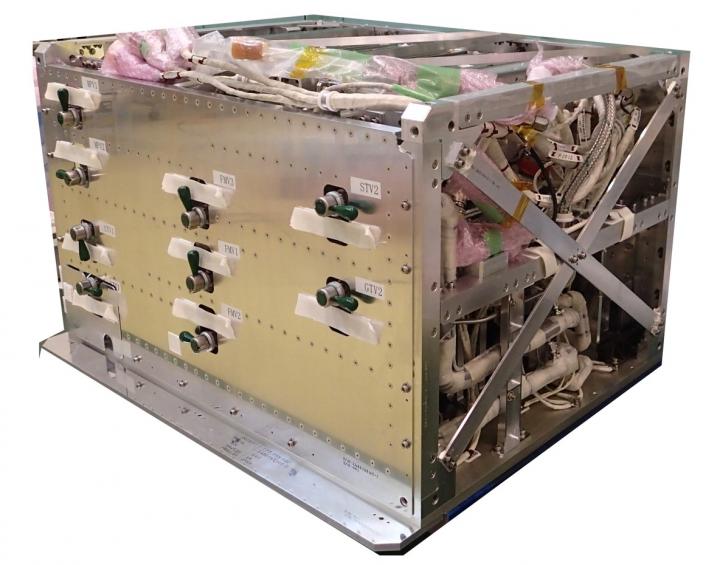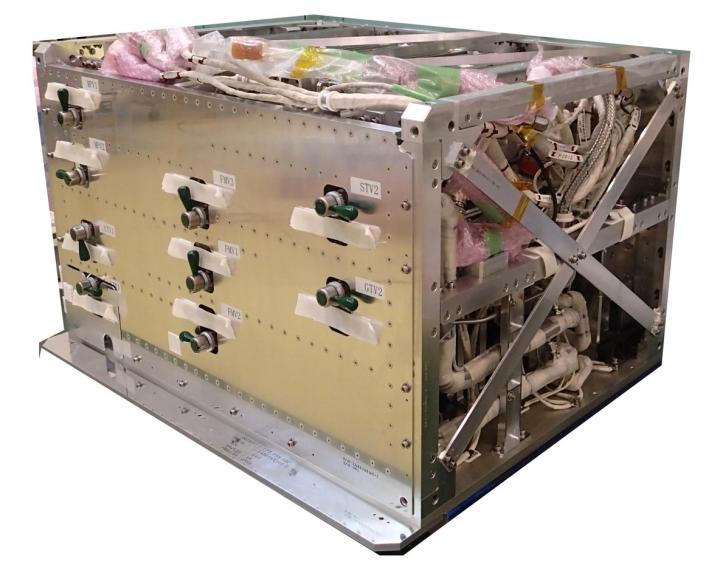
Credit: JAXA
As spacecraft become larger, the heat they produce also increases. That means vehicles built for long-term space exploration need more efficient cooling systems.
The Two-Phase Flow investigation looks at the heat transfer characteristics of how boiling liquids turn into vapor in microgravity. Flow boiling is boiling with forced flow over a heated surface, while two-phase flow refers to both phases – vapor and liquid – flowing together in a single channel or tube. Using a loop with a transparent heating tube aboard the International Space Station, researchers will establish flow rate, heating power, ratio of vapor to total flow, and other effects under different conditions. These data will contribute to better fundamental understanding of the behavior of liquid and vapor and the mechanism of how heat is transferred in microgravity.
On Earth, this understanding has potential applications in cooling system design for high performance computers, data servers, and electric vehicles.
Satoshi Matsumoto, a project scientist with the Japan Aerospace Exploration Agency (JAXA), said "Thermal management systems must remove large amounts of thermal energy, transport waste heat long distances to radiators, and cool high levels of thermal energy generated by power devices. Accomplishing all this requires more efficient methods to remove thermal energy, and devices using boiling and two-phase flow show more promise than conventional methods."
Boiling removes heat by turning liquid into vapor at the heated surface. Cooling systems use condensers that cool the vapor and produce condensation on the surface of the unit, thus turning that vapor back into a liquid, in a continuous cycle. In a two-phase flow system, heat is removed when the liquid vaporizes during boiling, resulting in high-performance heat removal and transportation.
Mixtures of liquids and bubbles behave very differently in space, however.
On Earth, bubbles generated by boiling leave the surface of the liquid because of buoyant force – the bubbles are about 1,000 times less dense than the liquid. That buoyant force disappears in microgravity, so bubbles do not easily detach from the surface. They essentially form an insulating layer at the surface and could significantly decrease heat transfer.
The investigation will establish a database useful in designing next-generation systems for managing heat in space. Currently, no coherent database exists for the flow and heat transfer behaviors of mixtures of liquids and vapors used for flow boiling in microgravity.
"A database of boiling two-phase flow also can show us the conditions where gravity effect disappears, even if the coolant or geometry of pipes change," Matsumoto said. "This is important for designing cooling systems for space referencing results from the orbital experiment despite the limited number of experimental conditions."
"In summary, our scientific goals are to clarify detailed mechanisms of heat transfer, establish a map of the dominant forces, and clarify details of liquid-vapor flow behaviors," said principal investigator Haruhiko Ohta, a researcher in the Department of Aeronautics and Astronautics at Kyusyu University in Japan. "This microgravity experiment will advance fundamental understanding of boiling two-phase flow, especially the relationship between the heat transfer and behavior at the interface."
In addition, JAXA will establish standards for spacecraft thermal management systems using boiling two-phase circulation loops, including heat pipe loops as an alternative passive method to the pumped loop tested in this investigation.
More efficient thermal management systems, in space and on Earth, will help us keep our cool.
###
Media Contact
Rachel Hobson
[email protected]
281-244-7449
@NASA_Johnson
http://www.nasa.gov/centers/johnson/home
############
Story Source: Materials provided by Scienmag





